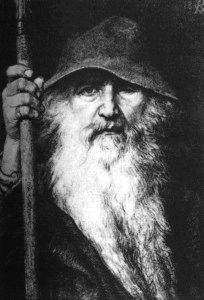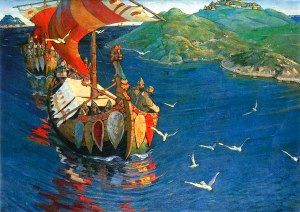 “Odin the Wanderer” by Georg von Rosen (1886)
“Odin the Wanderer” by Georg von Rosen (1886)
Norse Mythology for Smart People provides reliable, well-documented info on the fascinating mythology and religion from the Norse/Germanic peoples. If that’s what you’re searching for, you’ve come right place.
What’s Norse mythology?
Prior to the Norse (a.k.a. the Vikings) along with other Germanic peoples were transformed into Christianity throughout the Dark Ages, they’d their very own highly sophisticated and sophisticated indigenous religion. Norse mythology may be the group of religious tales the Vikings told to each other. These myths revolved around deities with fascinating and highly complex figures, for example Odin, Thor, Freya, and Loki.
The faith from the Norse along with other Germanic peoples didn’t have a real name – individuals who practiced it simply known as it “tradition.” However, individuals who ongoing to follow along with that old ways after the appearance of Christianity were sometimes known as “heathens,” which initially meant simply “people who survive the heaths” or elsewhere within the countryside, and also the name has stuck. Throughout this website, I think of it as “the heathen Germanic religion,” “the pre-Christian Germanic religion,” or something like that to that particular effect.
Norse mythology was for that heathen Germanic peoples exactly what the tales within the Bible will be to Christians and just what the doctrines of evolution and historic progress will be to modern science and secular society: grand narratives that provide existence meaning which help individuals to understand the planet.
Ultimately, Norse mythology presents a worldview that’s very, quite different from the worldview of contemporary science or those of most contemporary “world religions.” The pre-Christian Germanic religion was animistic, polytheistic, pantheistic, and held a cyclical look at time.
 “Guests from Overseas” by Nicholas Roerich (1899)
“Guests from Overseas” by Nicholas Roerich (1899)
Who have been the Vikings?
The Vikings were seafaring players, raiders, and explorers from modern-day Norwegian, Norway, Denmark, and Iceland who embarked throughout much around the globe throughout the Viking Age (roughly 793-1000 CE). They traveled as china as Constantinople so that as far west as The United States looking for riches to plunder and fertile lands to settle. They spoke that old Norse language, authored in runes, and practiced their ancestral religion.
The reason why behind Viking raids and settlements during this time period are plenty of and can include population pressures, demographic changes, our prime value put on recognition and competitive accomplishments in traditional Germanic society, along with a need to retaliate from the violent incursions of Christianity among the Norse along with other Germanic peoples which were occurring through the Viking Age.
The Vikings are a fundamental part of study regarding the indigenous mythology and religion from the Germanic peoples because most what we should learn about these topics originates from Scandinavian and Icelandic poems, treatises, and sagas which were written during or relatively right after the Viking Age.
Who’re the Germanic peoples?
The Germanic peoples are among the indians of northern Europe, combined with the Celts, Sami, Finns, yet others. In the past, they’ve occupied a lot of Scandinavia, Iceland, the Uk, and continental Europe north from the Alps. In the current era, they’re disseminate around the globe.
While there have been certainly regional and temporal variations within the pre-Christian religion from the Germanic peoples, there is nonetheless a typical core worldview, cosmology, and, to some large extent, a typical pantheon too.
If you are an individual of northern European descent (including British and German descent), it’s a secure bet that you have some Germanic bloodstream in your soul. Which means, consequently, that it is a secure bet that a number of your ancestors practiced something very, not far from the faith symbolized by Norse mythology.
Obviously, you perfectly can always find Norse/Germanic mythology to become fascinating and illuminating should you not have Germanic inside your ancestry. Mythologies are extremely expressions of a person or people, but they’re not even close to that there is commonly a spark of some thing timeless and universal in them also.
Til árs ok friðar,
Daniel McCoy
Resourse: http://norse-mythology.org/


